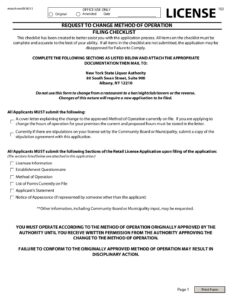In 2025 the SLA modified its form to request a change in the Method of Operations required in allowing the SLA to approve dancing and live music in locations now available for dancing by the NYC zoning change, and seemingly approving surrendering its authority to Community Board stipulations and signalling approving conditions which violate the First Amendment as to Live Music.
<Updated March 10, 2025>
That Applicant required to provide information on existing Method of Operation suggest that SLA does not have control on documents and correspondence relating to specific licenses. This suggests that SLA may not endorse all documents received with the License Number or Legacy Serial Number and date.
In January 2025 SLA modified its form to Request a Change in the Method of Operation modifying the version that appeared in 2013. Both versions are shown below.
The new form instructions do not indicate that a notice is to be provided to the Community Board nor that the notice may be filed concurrently with filing an application to the SLA as per the 2024 amendments to the ABC.
SLA continues to suggest restrictions as to music violating the First Amendment and to encourage using patron dancing as being appropriate to regulation by the SLA.
Moreover, the SLA form does not address the complication where an applicant may have agreed with a Community Board in a stipulation not to apply for any modification of its license without obtaining the permission of the relevant Community Board.
An example is the stipulation in the Eldridge case. https://iapps.courts.state.ny.us/nyscef/ViewDocument?docIndex=q_PLUS_h0ed_PLUS_KErvO076V_PLUS_kbwUQ==.
The 2015 version requires that the Applicant provide the Method of Operation provisions in its existing Liquor License Application and “if there are stipulations on your license set by the Community Board or Municipality, submit a copy of the stipulation agreement with this application.” That Applicant is required to provide information on existing Method of Operation suggest that SLA does not have control on documents and correspondence relating to specific licenses. This suggests that SLA may not endorse all documents received with the License Number or Legacy Serial Number and date.
Comments Re Method of Operation
We assume this change was made being mindful of the change in New York City zoning law to allow dancing in most place, yet the SLA has moved ahead not recognizing the change in attitude in the City.
As discussed elsewhere, were are unable to find any provisions of New York State law which allow the SLA to delegate it license approval authority to a Community Board stipulation which limits the flexibility and authority of the SLA to modify licenses. To be clear, Community Boards do no have the legal status to litigate to enforce a stipulation – rather, the stipulations attempt to make it appear as if the SLA can enforce a stipulation. It is clearly understood that the Community Boards impose stipulations by essentially strong arming the applicants to hold up an application or to require full board consideration by the SLA. Many Applicant just routinely accept “no dancing” in a stipulation to avoid holding up an application.
The Method of Operation form signals that the SLA is willing to impose restriction on live music which violate the First Amendment and invites Community Boards to do the same. New York City in the 1980’s lost litigation on these issues, and but the SLA suggests the propriety of these anti-content provisions. The Form requires Applicants to state the following as to Live Music:
Live Music (give details: e.g., rock bands, acoustic, jazz, etc.):
The 1980s litigation was focused on Cabaret Law type restrictions as to the type of music and number of musicians and implicitly favored classical over jazz music. The SLA questions are also completely out-of-date by suggest the method of operation may include limits on “acoustic” music. For example, many establishments may not easily accommodate acoustic pianos (space, tuning, maintenance) and most pianists will bring in their electronic pianos. Similarly, basses and guitars and even violins are largely performed on electronic instruments – and any restrictions as to acoustic music is a First Amendment violation. The issue is whether the Licensee will limit noise by sound reduction materials and sound measurement etc. Also, implicit and unstated here is no “rap music” – Kendrick Lamar need not apply. The SLA invites these First Amendment violations.
One wonders what Method of Operation information the SLA compiles as to a particular licensee. The SLA at the same time has deleted Method of Operation information from it licenses database and omitting such information from it LAMP interface.
The 2013 Form:
request-to-change-method-operation-change-as-revised-093013The 2025 Form:
Request to Change method-of-operation-change-01222025-final